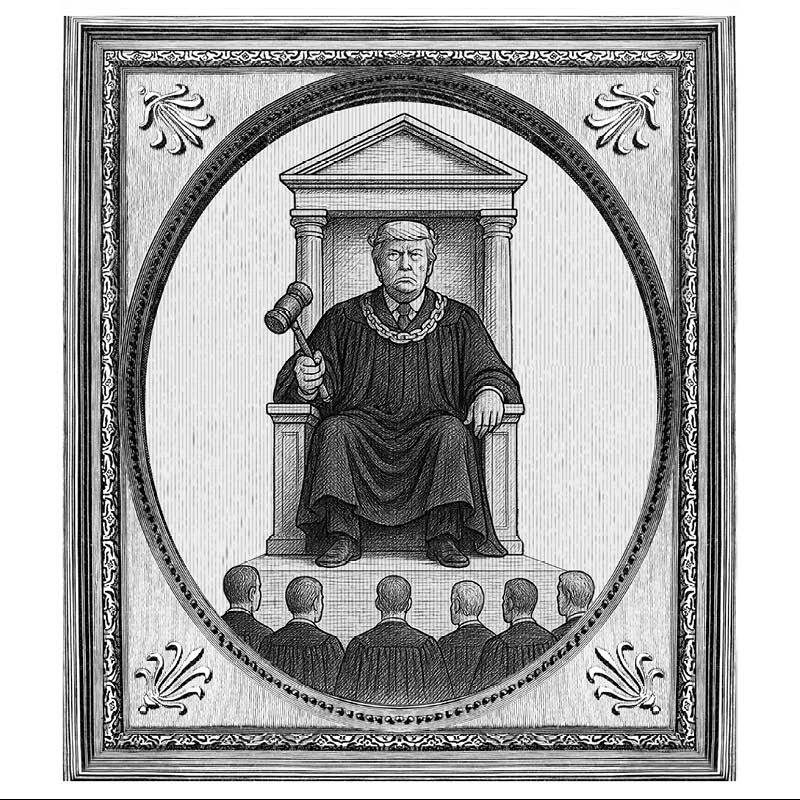Legend has it that after subduing Greece, Egypt, Persia, wide swaths of India and what’s now Afghanistan, Alexander the Great wept, lamenting “there are no worlds left to conquer.” Donald Trump is close to knowing how that feels. “I run the country and the world,” he declared in a recent Atlantic interview. Trump’s second term has barely begun, but already the thought must cross his mind: “What next?”
Alexander was lucky to die young, at 32 and at the peak of his power. The President is in rude health and leads a charmed life. The grim reaper missed him last year when an assassin’s bullet grazed his ear in Butler, Pennsylvania. As it stands, Trump can look forward to leaving office, aged 82, in January 2029. He’s conquered the world only to lose it to term limits. And once he’s back in private life, what are the odds his enemies don’t renew their lawfare against him?
Trump’s life is a story of rise, fall and rise higher: from New York real-estate tycoon, to greater national fame as a reality TV star, to the pinnacle of politics on the world stage as well as at home. Elon Musk may have Mars, but Trump needs another world to conquer.
When Trump muses about running for a third term as president, he’s not exactly joking, regardless of what the Constitution might say. Maybe a really clever lawyer could find a way – like having the Vice-President indefinitely delay certification of the next Electoral College vote around January 6, 2029. But… no. There really isn’t a way around the 22nd Amendment short of repealing it, and that would be harder than winning last year’s election was, even in the face of all the adversity arrayed against him.
If Trump wants to make the Supreme Court his next world to conquer, Senate Republicans won’t stop him
Yet there’s another office Trump could seek – one that affords as much protection from prosecution or assassination as the presidency does. It’s an office that would allow Trump to reshape the nation in new and perhaps even more lasting ways. Conveniently, this other office doesn’t have term limits. Instead of running for president a third time, Trump could put himself on the Supreme Court. That’s absurd, you say – Trump doesn’t have a judicial temperament! He’s not professionally qualified! But there are no qualifications under the Constitution for the job, other than that a presidentially nominated candidate must be approved by the United States Senate. There’s no requirement that a justice be a lawyer or have any experience in the judiciary. As for a judicial temper, Trump doesn’t have what most would call a presidential temperament, either – but that hasn’t stopped him from winning the prize twice.
There’s precedent for an ex-president serving on the Supreme Court: William Howard Taft lost his presidential re-election bid in 1912, in a three-way race with Woodrow Wilson and Theodore Roosevelt. But the next Republican president, Warren Harding, placed Taft on the Supreme Court in 1921 – as chief justice, no less.
Would Trump actually want to be a justice, merely one of nine, plowing through months and months of testimony and amicus briefs? Would he refrain from taking his opinions to social media before the Court reaches its rulings?
He might take the job just to show he can, and it would be the sweetest revenge on judges at every level who have tried to thwart his presidential agenda. No doubt Trump wouldn’t behave anything like a typical justice: he’d confront the Supreme Court with the same reckoning he’s brought about in the elected branches of government. His dissenting opinions would be broadcast on Truth Social, inaugurating a new era of robust democratic engagement for the most anti-democratic of our institutions. Trump does, however, keep truly sensitive deliberations, whether over real estate or his own presidential policies, confidential.
No one could stop Justice Trump from transforming the Court the way President Trump has transformed the executive branch: impeaching and removing a justice is no easier than impeaching and removing a president. The Constitution specifies the same procedures for both, with a two-thirds majority in the Senate needed for a conviction. And Trump has beaten that system twice already.
Republicans in the Senate, as well as in the House of Representatives, may well want Trump to be somewhere other than in the White House ahead of the 2028 election. Vice-President Vance, presumptive front-runner for the top of the GOP ticket, would certainly get a leg up on winning the general election if he were already sworn in as president well before November 2028.
Late in their second terms, presidents are more often a drag on the electability of their party’s congressional candidates. George W. Bush wasn’t making Republicans more popular in 2008, and Barack Obama, though well-liked by the public, nonetheless prepared the way for the GOP to hold Congress and win the presidency in 2016. Democrats were anemic at the end of Bill Clinton’s second administration too, though they had the good fortune to be facing weak Republicans with George W. Bush atop the GOP ballot in 2000.
Would self-interest motivate Senate Republicans to go along with Trump’s self-appointment? If the GOP holds the Senate after next year’s midterms, what could possibly weaken Trump’s grip on his party’s legislators? If he wants to make the Supreme Court his next world to conquer, Senate Republicans won’t stop him.
Yes, all this seems far-fetched – but then, so does everything that’s actually happened in American politics since Trump came down the escalator in 2015. Should a justice die or retire, or if the GOP decides to borrow a move Joe Biden contemplated and pack the Court with more justices, Trump has a clear shot. “Justice Trump” may sound wildly implausible, but he has done the impossible before.
This article was originally published in The Spectator’s June 2025 World edition.























Leave a Reply